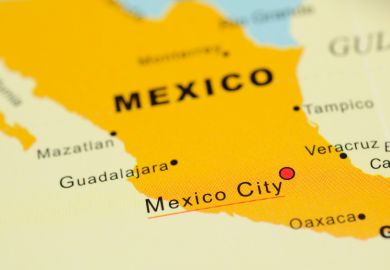I first set eyes on Mexico’s president, Andrés Manuel López Obrador (or Amlo, as he is known), several years before he took office. It was at a rally in Mexico City’s central square. I was a long way away, but even from a distance, his charisma and the adoration of his followers were obvious.
He retains that admiration among vast sections of the population, and the full-scale campaign against waste in government that has characterised his first seven months in office is widely supported. But less so among those of us who work in the research institutes and universities that have been caught up in the austerity net.
Even before Amlo took office, the Congress (with his approval) passed legislation to reduce benefits to public sector workers; we lost health benefits, contributions to pension plans and seniority pay. The new law also forbids pay from non-salary sources. This will affect our compensation, given the productivity-based incentives in areas such as publications that to some extent compensate for our low salaries. Basic pay has not increased even nominally since 2009 and, in real terms, is now 60 per cent of what it was in 2006 (about £1,500 per month after taxes).
The Centre for Research and Teaching in Economics (CIDE), where I work, is one of 26 centres run by CONACYT, Mexico’s national science foundation. Despite having only 125 full-time academics and less than a thousand students, we are nevertheless enormously influential in Mexico, contributing to world-class academic research, policy debates, media activity and lifelong learning. Our graduates go on to occupy top positions in public life. Yet, like other CONACYT centres and public institutions, we have taken a huge hit financially during this emerging period of austerity. Our budget for 2019 is likely to be about 30 per cent lower than it was in 2016.
We have voiced our concern repeatedly to various government bodies, including CONACYT, but have met with a mixed reception. Amlo himself is famous for not having much truck with experts like us. He prefers “popular thinktanks”: sometimes a referendum, sometimes a show of hands at a rally. He associates the “neoliberal” regime with Mexico’s corruption problem, and blames scientists and intellectuals for defending the former.
Cuts have also been made to already low library budgets, research assistantships, student scholarships and other scholarly resources. We have scrambled to create a lecturer’s union to try to defend our rights – somewhat late in the day, but better than nothing. Nevertheless, some colleagues have left and others are openly looking for work outside Mexico.
For a time, we thought we may not see them again at international conferences. One of Amlo’s most drastic proposals was to freeze international travel for all public sector workers. To leave the country for academic activities, we would have had to ask permission from the president himself. This has now been amended, fortunately, but equally alarming is that the new CONACYT director, María Elena Álvarez-Buylla Roces, told members of Congress that the administration is seeking “scientific sovereignty”. This is very much in accord with Amlo’s well-known disdain for all things international: in his first seven months in office he has not left Mexico and will not attend this week’s G20 meeting in Osaka. Álvarez-Buylla may not intend to adopt the exclusionist and nationalistic measures that her words conjure, but at the very least she fails to recognise that successful academia requires openness and collaboration.
Although public, CIDE is autonomous in terms of its research and opinions. This is incredibly important given the legacy of authoritarianism in Mexico. Indeed, many of CIDE’s leading lights through the years were refugees from authoritarian regimes in South America. There is no sign that this independence will be challenged, but the self-moderating influence is notable nonetheless; most of us are being careful about the tone we set in public discourse.
To be fair, Amlo is no Hugo Chávez, as he is sometimes accused of being. The funding cutbacks began three years ago, under the last president, and, despite them, several very strong young colleagues are set to fill some of our vacancies at CIDE. Moreover, if the present challenges prompt a simplification and clarification of the academic salary and compensation system then they will have done us a service.
But while Amlo’s priorities of addressing corruption, poverty and inequality would be at the top of anyone’s list, even a cursory glance around the world makes it obvious that the way to tackle these problems is not to weaken the state. Quite the reverse. Institutions of transparency, monitoring, accountability and justice – not to mention effective social programmes – need good people and adequate budgets to do their work.
We in academia can help – and we have been helping for quite some time through our research on governance and social policy, our work with civil society and our policy activities. But we also need adequate resources, as well as the ability to connect with ideas, scholars, practitioners, funding agencies and other global networks. If the government really wants to strengthen science and technology, improve higher education, upgrade knowledge, and jump-start development, it would do well to pay attention to these concerns.
Mark Aspinwall is a research professor in the Division of International Studies at the Centre for Research and Teaching in Economics (CIDE), Mexico City, and honorary professorial fellow at the University of Edinburgh.
POSTSCRIPT:
Print headline: Mexican stand-off
Register to continue
Why register?
- Registration is free and only takes a moment
- Once registered, you can read 3 articles a month
- Sign up for our newsletter
Subscribe
Or subscribe for unlimited access to:
- Unlimited access to news, views, insights & reviews
- Digital editions
- Digital access to THE’s university and college rankings analysis
Already registered or a current subscriber?








